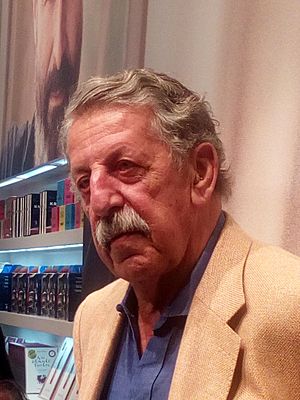Ulrich Kienzle facts for kids
Quick facts for kids
Ulrich Kienzle
|
|
|---|---|

Kienzle in 2017
|
|
| Born | 9 May 1936 Neckargröningen, Württemberg, Germany
|
| Died | 16 April 2020 (aged 83) Wiesbaden, Germany
|
| Education | |
| Occupation |
|
| Organization | |
| Awards | |
Ulrich Kienzle (born May 9, 1936 – died April 16, 2020) was a German journalist and writer. He was especially known for his deep knowledge of the Middle East's politics and culture. Kienzle worked for major German TV channels like ARD and ZDF. He was one of the few Western journalists who got to interview important leaders like Muammar Gaddafi in the 1970s and Saddam Hussein in 1990. Kienzle was also famous for appearing on Frontal, a ZDF TV show where he debated political topics.
Contents
Early Life and Education
Ulrich Kienzle was born in Neckargröningen, which is now part of Baden-Württemberg in southwest Germany. He was nine years old when World War II ended. When he was 13, the Federal Republic of Germany was founded.
From 1956 to 1963, Kienzle studied at the University of Munich and the University of Tübingen. He earned a university degree in political science. He also studied German and art history.
Journalism Career
Ulrich Kienzle started his career as a journalist in 1956. He first worked as a freelancer. Later, in 1963, he became a permanent editor for the "Evening News" show at Süddeutscher Rundfunk (SDR) in Stuttgart.
Working for Regional Broadcasters
After a short time at Westdeutscher Rundfunk (WDR) in 1967 and 1968, he returned to SDR. He became the main anchor for the "Evening News" show in 1968. From 1972 to 1974, he helped host and edit "Kompass." This was a show about foreign affairs made by SDR and Bayerischer Rundfunk.
Becoming a Foreign Correspondent
In 1974, Kienzle began working for ARD, a national public broadcaster. He became a foreign correspondent, reporting from other countries. From 1974 to 1977, he covered the Middle East while based in Beirut. He was one of the first journalists to interview Muammar Gaddafi, who was a young rebel leader at the time.
From 1977 to 1980, he was ARD's correspondent for Southern Africa. He reported on important events happening in that region.
Leading News Teams
From 1980 to 1990, Kienzle became the chief editor for Radio Bremen (RB). This meant he was in charge of all the news content for this northern German broadcaster.
From 1990 to 1993, he was the chief editor for foreign affairs at Hessischer Rundfunk. He also anchored "Auslandsjournal," a foreign affairs magazine show on ZDF. In 1990, he was one of the few Western journalists allowed to interview Saddam Hussein, the leader of Iraq.
Political Debates on Frontal
From 1993 to 2000, Ulrich Kienzle was a key part of the weekly ZDF political show called Frontal. On this show, he had lively debates with fellow journalist Bodo Hugo Hauser. Kienzle often represented a more left-leaning viewpoint, similar to the Social Democratic Party. Hauser usually took a more right-leaning position, similar to the Christian Democratic Union. Their debates were well-known and often controversial.
Later Work and Legacy
In the 2000s, Kienzle hosted a ZDF program about German political campaigns. He also contributed to a ZDF show about the economy called "WISO" starting in 2003. He was often asked to share his expert opinions on events in the Middle East. These included the Iraq War, the War in Afghanistan, and the Arab Spring revolts.
Ulrich Kienzle passed away in Wiesbaden, Germany, on April 16, 2020, at the age of 83. He left behind a legacy as a respected and influential journalist.
Awards and Recognitions
Ulrich Kienzle received several important awards for his work in journalism.
- 1977: Order of Merit of the Federal Republic of Germany. He received this high honor for his reports from the Lebanese civil war.
- 1983: Eduard Rhein Prize. This award recognized his excellent work in radio and television. He won it for his report titled Bloody Summer – Reunion with Beirut.
- 1995: BAMBI. This is a famous German media prize. Kienzle received it along with Bodo Hugo Hauser for their work on Frontal.
- 2004: Journalist Prize of the German Mittelstand. He earned this award for his critical and insightful journalism.

